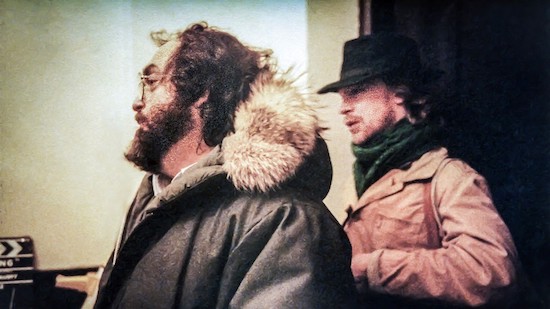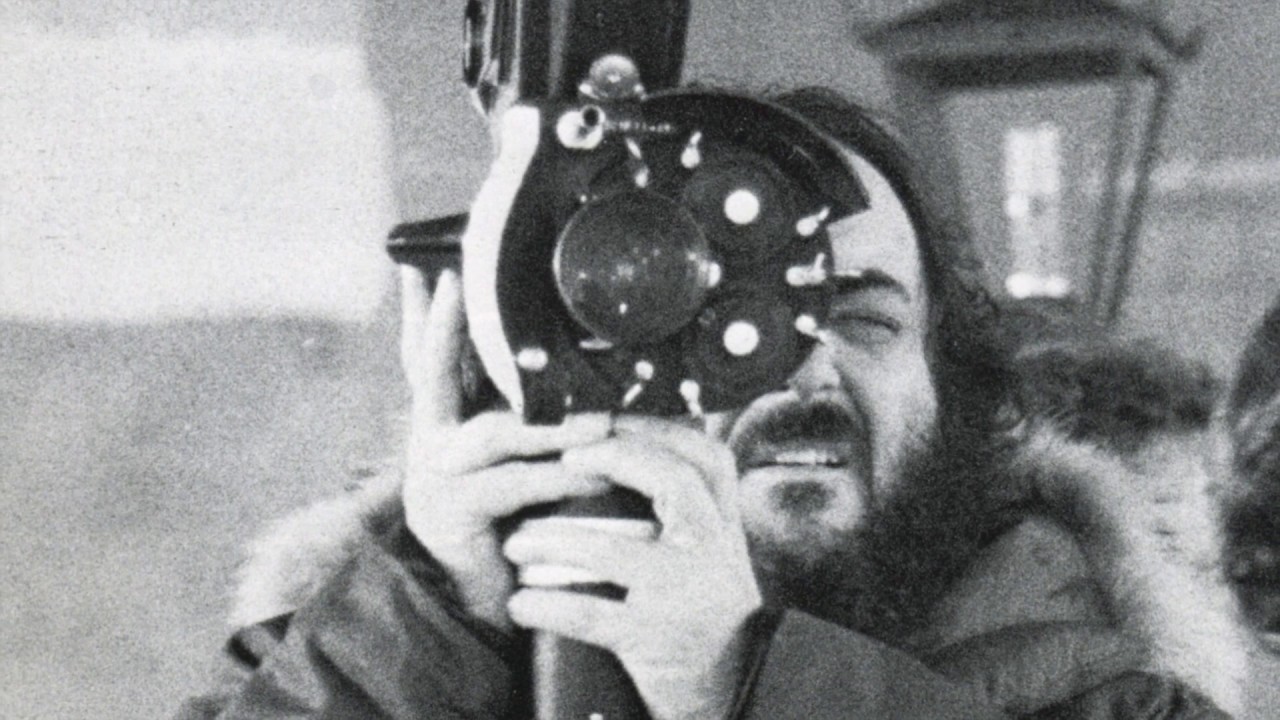“People would meet Stanley and they’d say, ‘I’d give my right arm to work for you.’ He would just smile at them, because he was probably thinking, ‘Why are you lowballing me? Just the right arm? How about the left one, and the legs, and the body, and the heart?’”
So says Leon Vitali, a man who for thirty years put his every breath and every thought at the service of the film director Stanley Kubrick. Filmworker, the new documentary by Tony Zierra, pays homage to Vitali’s dedication, and by extension all those people whose names scroll up the screen at the end of a film, long after most of us have left the cinema.
Vitali’s sacrifice is all the more extraordinary when we discover he was already a successful young actor when he first came to work for Kubrick, performing Shakespeare in the theatre, appearing regularly on television, starring in a couple of films, sharing the billing with actors like Martin Sheen and Michel Gambon. But after seeing 2001, and then A Clockwork Orange, Vitali was determined to work for the prodigious director. He got his break a couple of years later, playing the part of Lord Bullingdon in the epic pastoral Barry Lyndon, released in 1975.
But this was just the beginning. On set, Kubrick’s meticulous, frequently maddening approach, opened Vitali’s eyes to the difference between merely shooting a film and filmmaking. Kubrick’s notorious insistence on the constant repetition of scenes, as he experimented with different lenses, lighting and angles, introduced Vitali to the kind of commitment expected of those who wanted to be part of one of his pictures. In the scene where Ryan O’Neal, playing Redmond Barry, assaults Bullingdon, Kubrick complained that O’Neal wasn’t hitting him hard enough. “We did it thirty times,” says O’Neal. “And I know I hurt Leon. I didn’t want to, but this was Stanley.”
Vitali endured this typically Kubrickian trial by ordeal uncomplainingly, and it made such an impression on the director that he took Vitali aside to say he intended to include him in more scenes, keeping him on to the end of the production.
It would be easy to see this as a fitting metaphor for their relationship’s dynamic over the next three decades, Vitali the loyal body man, quietly absorbing the wrath of the incendiary auteur. But while this was true at times – particularly when shooting Full Metal Jacket – it fails to convey the symbiosis at work, the extent to which the director came to rely on Vitali as his surrogate eyes and ears, especially outside the UK, given Kubrick refused to fly anywhere.
After Barry Lyndon, Vitali’s stock increased, and he had enough offers to build a highly successful career as an actor. But having received encouragement from Kubrick upon expressing a desire to pursue life on the other side of the camera, when the director called him up asking if he’d go to America to find a boy to play Danny Torrance in his next production, The Shining, Vitali didn’t think twice about it. “Why would someone put their whole career on hold for another individual?” asks Director Nick Redman in the documentary. “I think because they recognize in that individual something you don’t see in ninety per cent of the human race.”
Once embedded in the small, tight-knit Kubrick production unit, based out of Childwickbury Manor in leafy Hertfordshire, not far from Elstree Studios, Vitali describes going through the large wrought iron gates, in his mind hearing them clang ominously shut behind him, like something out of a Hammer film. “This was it. There will be no more ‘you’ until you’re driving out of here again,” he says. That would usually be in the early hours of the morning, and even then he might be straight on the phone when he got home to talk for hours with Warner’s in America or distributors in Japan. Many of those interviewed in Filmworker attest to never seeing Vitali sleep, and the latticework of lines and grooves in his features bring to mind David Hockney’s comment on the poet WH Auden – “If that’s his face, what must his scrotum look like?” Vitali’s own son, Max, describes how Vitali would sleep on a doormat in the office so he could wake up a couple of hours later, never wanting to be too comfortable to oversleep.
And what were all those hours spent doing? It could be anything, from casting to dialogue coach to soundman to organizing closed-circuit monitors to keep an eye on Kubrick’s beloved cats and dogs; he worked on layouts, colour timing and prints in the processing lab; he took charge of sales and licensing, put together trailers for dozens of countries, organized video and digital transfers. The daily To Do list would have girded the planet several times over. Yet when he came to put a job title on his visa he simply wrote ‘Filmworker’. Vitali had just as much distain for self-aggrandising corporate bullshit as Kubrick did. Yet his skills were irreplaceable according to Nick Redman. “If Leon had ever tried to make a break for the hills, I think he’d have been prevented from doing it.”
But Vitali never felt the urge, despite Kubrick’s work ethic causing countless others in his crew to have nervous breakdowns. There was genuine love here, and a perverse kind of dependency, and it’s revealing to discover that Vitali’s own father, an unpredictable man given to random bursts of rage and violence, died when Vitali was only eight-years-old, leaving a father-shaped hole in his life. “When it came to Stanley,” he says, “I understood from my experience with my dad, you take a step back. You didn’t confront, didn’t challenge. You let them blast their way out of whatever it was they had a problem with.”
What Vitali also spent a lot of time doing was making notes. In the documentary we see him in his loft, going through boxes and boxes of notebooks. Kubrick once said, “I don’t trust people who don’t write things down. Many people feel it’s beneath their dignity to take notes, and try instead to trust their memories. I don’t work with them.”
So Vitali took notes, most of which would be archived at Kubrick’s estate alongside endless rolls of film, cabinets full of stills, shelves lined with audio and video tapes, research material gathered from books, newspapers, magazines… it became like a pre-internet search engine devoted entirely to all things Kubrick, a stand-in for the man’s brain.
Later in the documentary we’re introduce to Vitali’s children, and you wonder where he found the time to even have a family in the first place. They talk fondly about both Kubrick and their father, but also how he was unable to pay them much attention, always on the phone at a desk, smoking endless cigarettes. “It was kind of Kafkaesque,” says his son, Max. “Piles of stuff that would never go away. I get exhausted just thinking about it.” Yet still Leon Vitali kept pushing the rock up the hill.
One Saturday afternoon on his way out of the supermarket, Vitali got a call from Kubrick. “We spoke for two and a half hours,” he recalls. “It was eerie because his voice had that same kind of gentleness as on the very first day I met him. Everything was rational and measured, more relaxed than it had been for quite a while.” In the early hours of the following morning, Kubrick died. Eyes Wide Shut was about to wrap, but it was left to Vitali to take care of it, and as soon as Kubrick was dead, the knives were out from all those who’d felt disrespected by the director but too chickenshit to confront him directly. Vitali naturally became their target.
But he weathered that storm like he weathered so much else, and despite a tough period, where his weight reputedly dropped to sixty-five pounds and he seemed possessed by the spirit of Jack Torrance, writing repeatedly in a notebook, ‘I, Leon Vitali, am healing myself’, he got through it all, and in the process secured Kubrick’s own legacy, ensuring future generations would get to see the films in exactly the way the director intended them to be seen.
Filmworker is a brilliant documentary about a brilliant man who put himself entirely at the service of someone he saw as far more brilliant than he was. Not many people – and especially not many actors – have the wisdom or the courage to do that. “If you said to Stanley you’d commit yourself, you better make sure you mean it,” says Vitali. “Otherwise why would you bother? And anyway, if you weren’t going to give everything you’ve got, you’d betray yourself in the end. Because Stanley gave everything he had, and that’s what I saw and what I reacted to.”
Filmworker is available to watch on demand and will be released on DVD on 2nd July



